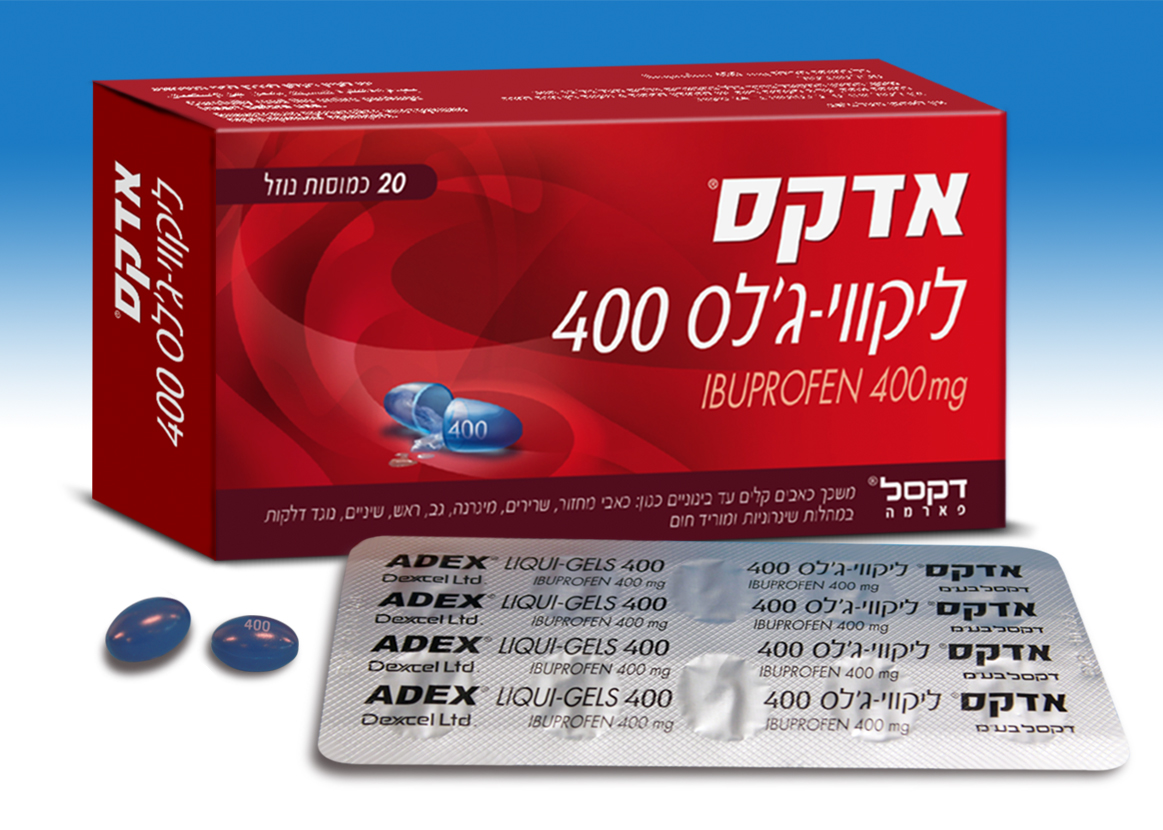Quest for the right Drug

אדקס ליקווי-ג'לס 400 ADEX LIQUI-GELS 400 (IBUPROFEN)
תרופה במרשם
תרופה בסל
נרקוטיקה
ציטוטוקסיקה
צורת מתן:
פומי : PER OS
צורת מינון:
קפסולות ממולאות נוזל : CAPSULES LIQUID FILLED
עלון לרופא
מינוניםPosology התוויות
Indications תופעות לוואי
Adverse reactions התוויות נגד
Contraindications אינטראקציות
Interactions מינון יתר
Overdose הריון/הנקה
Pregnancy & Lactation אוכלוסיות מיוחדות
Special populations תכונות פרמקולוגיות
Pharmacological properties מידע רוקחי
Pharmaceutical particulars אזהרת שימוש
Special Warning עלון לרופא
Physicians Leaflet
Adverse reactions : תופעות לוואי
4.8 Undesirable effects The list of the following adverse effects relates to those experienced with Ibuprofen at OTC doses (maximum 1200mg per day) in short-term use. In the treatment of chronic conditions, under long-term treatment, additional adverse effects may occur. Adverse events which have been associated with ibuprofen are given below, tabulated by system organ class and frequency. Frequencies are defined as: very common (≥1/10), common (≥1/100 to <1/10), uncommon (≥1/1000 to <1/100), rare (≥1/10,000 to <1/1000), very rare (<1/10,000) and not known (cannot be estimated from the available data). Within each frequency grouping, adverse events are presented in order of decreasing seriousness. System Organ Class Frequency Adverse Event Blood and Lymphatic Very rare Haematopoietic disorders1 System Disorders Immune System Uncommon Hypersensitivity reactions consisting of urticaria Disorders and pruritus. Very rare Severe hypersensitivity reactions. Symptoms could be facial, tongue and throat swelling, dyspnoea, tachycardia, hypotension (anaphylaxis, angioedema or severe shock).2 Nervous System Uncommon Headache Disorders Very rare Aseptic meningitis3 Cardiac Disorders Very rare Cardiac failure and oedema4 Vascular Disorders Very rare Hypertension4 Respiratory, Thoracic Very rare Respiratory tract reactivity comprising of asthma, and Mediastinal aggravated asthma, bronchospasm or dyspnoea. Disorders Gastrointestinal Uncommon Abdominal pain, nausea anda dyspepsia5 Disorders Rare Diarrhoea, flatulence, constipation and vomiting Very rare Peptic ulcer, perforation or gastrointestinal haemorrhage, melaena, haematemesis6, mouth ulceration and gastritis Not Known Exacerbation of colitis and Crohn's disease7. Hepatobiliary Disorders Very rare Liver disorders Skin and Uncommon skin rash2 Subcutaneous Tissue Very rare Severe forms of skin reactions such as bullous Disorders reactions including Stevens-Johnson syndrome, erythema multiforme and toxic epidermal necrolysis can occur. Not known Drug reaction with eosinophilia and systemic symptoms (DRESS syndrome) Acute generalised exanthematous pustulosis (AGEP) Photosensitivity reactions Renal and Urinary Very rare Acute renal failure8 Disorders Investigations Very rare Decreased haemoglobin levels, urea renal clearance decreased Infections and Very rare Exacerbation of infections related inflammation infestations (e.g. development of necrotizing fasciitis), in exceptional cases severe skin infections and soft- tissue complications may occur during a varicella infection. Description of Selected Adverse Reactions 1Examples include anaemia, leucopenia, thrombocytopenia, pancytopenia and agranulocytosis. First signs are: fever, sore throat, superficial mouth ulcers and flu-like symptoms, severe exhaustion, unexplained bleeding and bruising. 2Hypersensitivity reactions have been reported. These may consist of (a) non-specific allergic reactions and anaphylaxis, (b) respiratory tract activity e.g. asthma, aggravated asthma, bronchospasm or dyspnoea, or (c) various skin reactions, including rashes of various types, pruritus, urticaria, purpura, angioedema and more rarely exfoliative and bullous dermatoses (including toxic epidermal necrolysis, Stevens-Johnson Syndrome and erythema multiforme). 3The pathogenic mechanism of drug-induced aseptic meningitis is not fully understood. However, the available data on NSAID-related aseptic meningitis points to a hypersensitivity reaction (due to a temporal relationship with drug intake, and disappearance of symptoms after drug discontinuation). Of note, single cases of symptoms of aseptic meningitis (such as stiff neck, headache, nausea, vomiting, fever or disorientation) have been observed during treatment with ibuprofen, in patients with existing auto-immune disorders (such as systemic lupus erythematosus, mixed connective tissue disease). 4clinical studies suggest that the use of ibuprofen (particularly at high doses 2400 mg/day) may be associated with a small increased risk of arterial thrombotic events (for example myocardial infarction or stroke) (see section 4.4). 5 the adverse events observed most often are gastrointestinal in nature. 6 sometime fatal, particularly in the elderly. 7 see section 4.4 8 especially in long-term use, associated with increased serum urea and oedema. Also includes papillary necrosis. Reporting of suspected adverse reactions Reporting suspected adverse reactions after authorisation of the medicinal product is important. It allows continued monitoring of the benefit/risk balance of the medicinal product. Any suspected adverse events should be reported to the Ministry of Health according to the National Regulation by using an online form: https://sideeffects.health.gov.il

שימוש לפי פנקס קופ''ח כללית 1994
לא צוין
תאריך הכללה מקורי בסל
לא צוין
הגבלות
לא צוין
מידע נוסף
